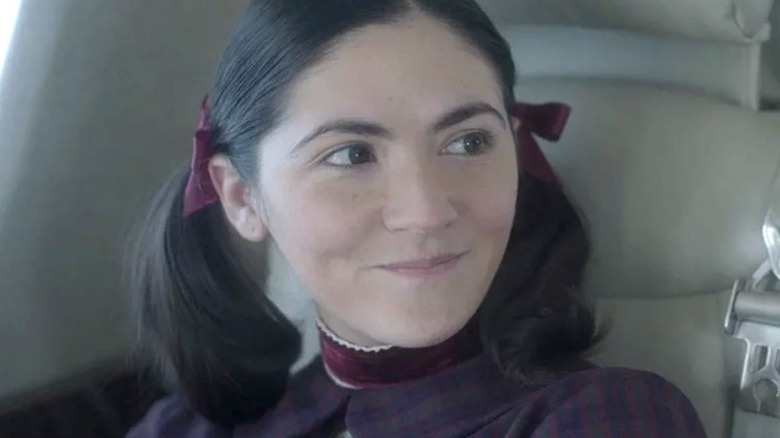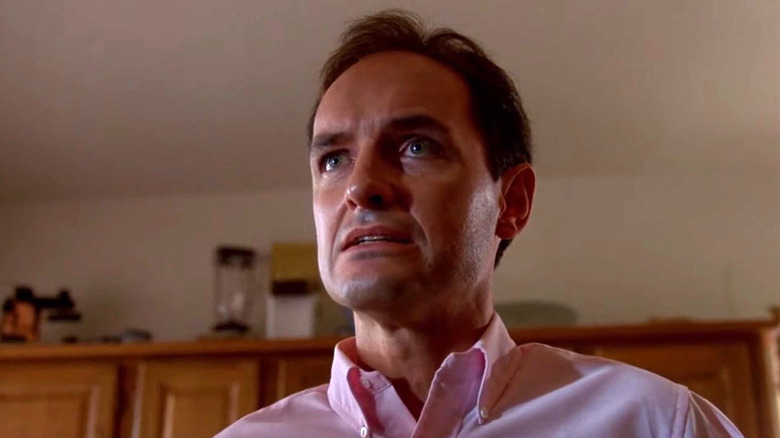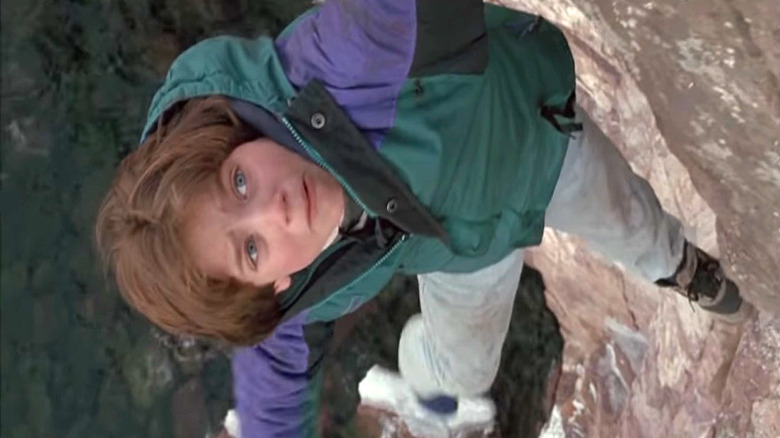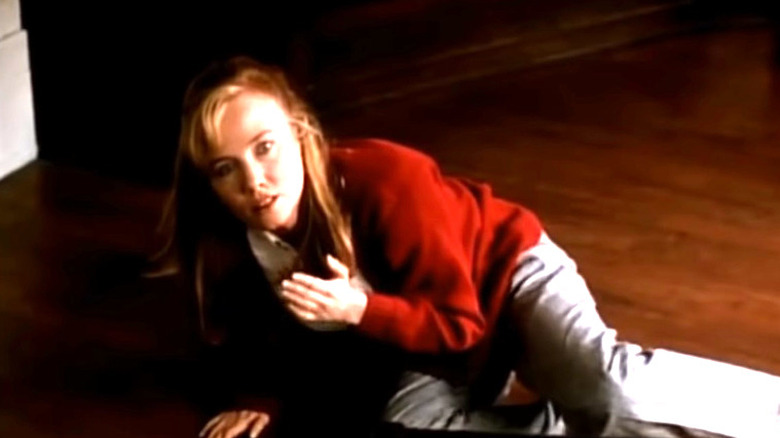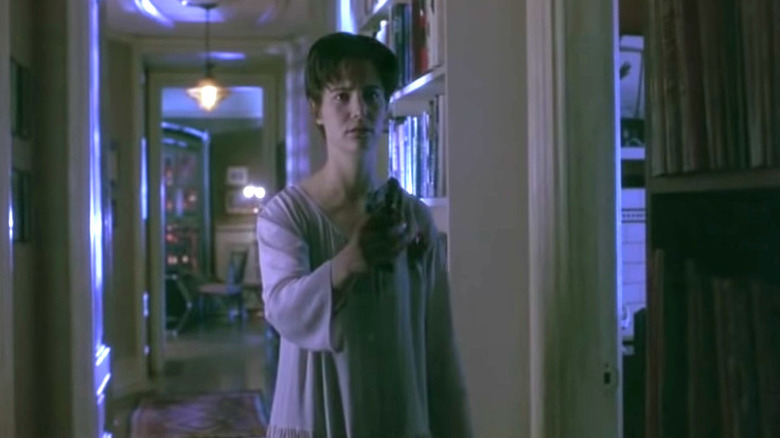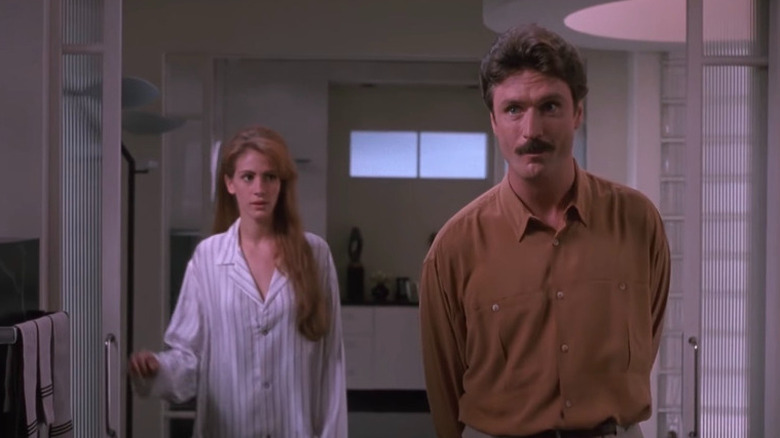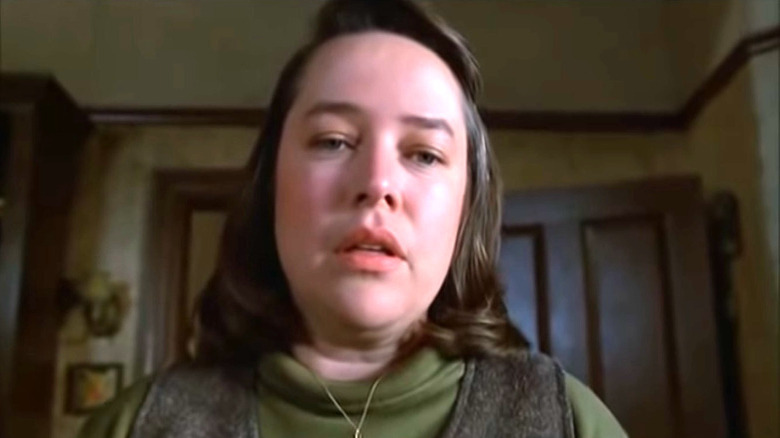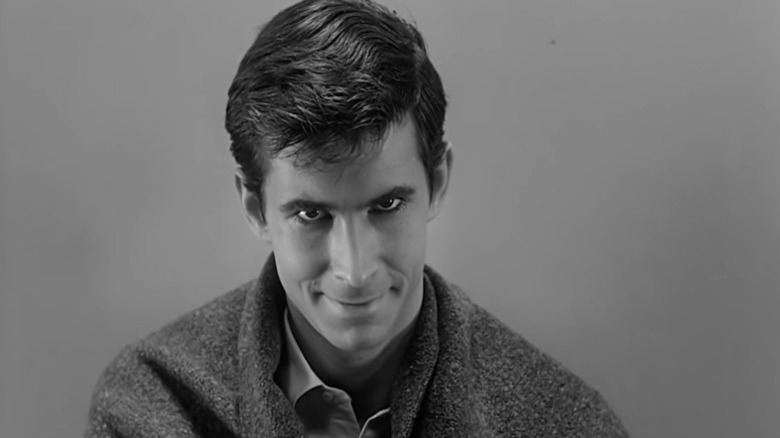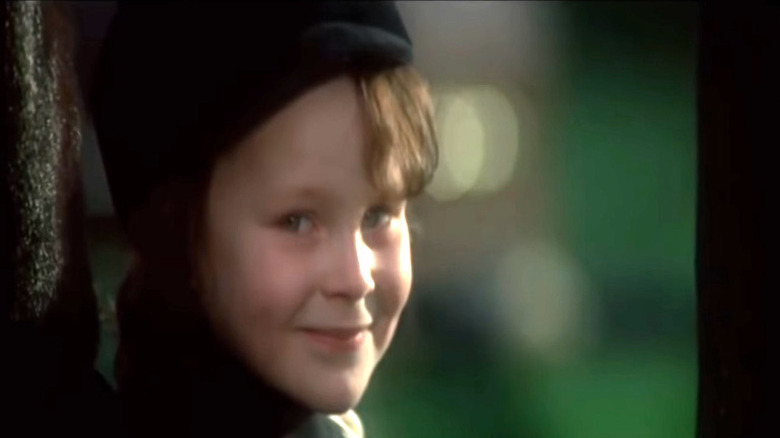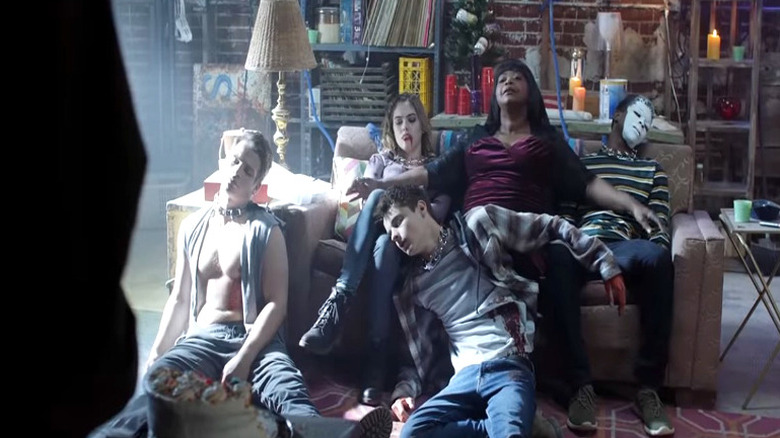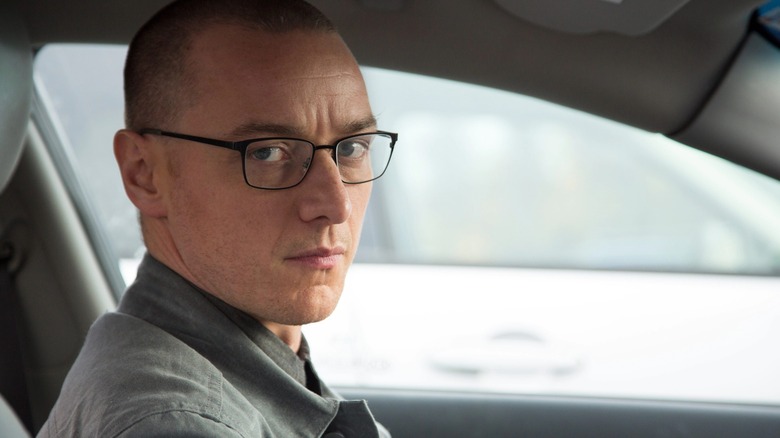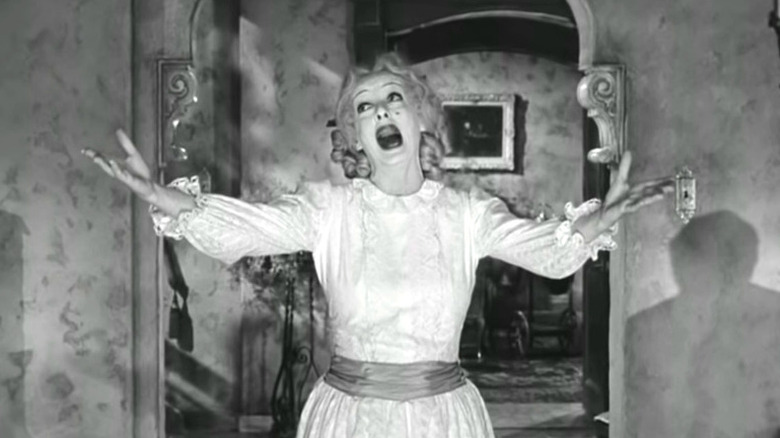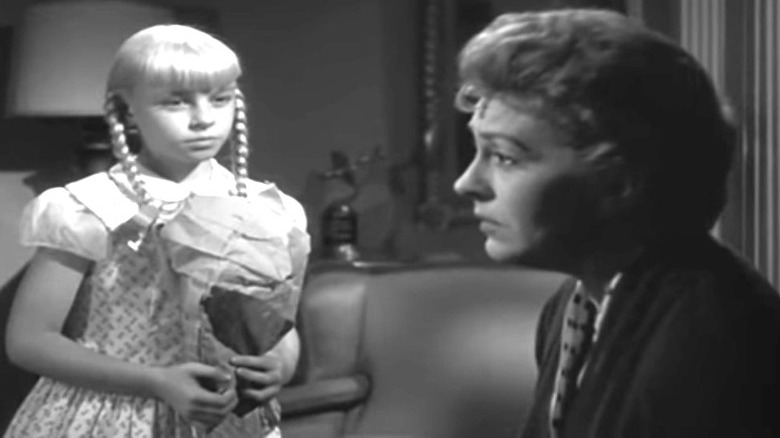12 Best Movies Like Orphan: First Kill That Fans Should Check Out
"Orphan: First Kill" is the prequel to the 2009 thriller "Orphan" starring Vera Farmiga and Peter Sarsgaard as grieving parents who adopt a little girl named Esther (played by Isabelle Fuhrman) who isn't actually a little girl. To their horror, this is an adult woman in her 30s with a gland issue that has stunted her growth around 10 years old. She has already conned other families into taking her in and killed them, signaling that they are next on her list.
In the prequel, we see how Esther (her real name is Leena) came to America and what happened to the first family she lived with. It sounds predictable, but there's a pretty important twist that changes the status quo, which we will not spoil here. The "Orphan" films belong to a genre that used to get the theatrical treatment, but has been relegated to channels like Lifetime over the last decade or so: the domestic thriller. Essentially, this is a kind of horror film that relies more on building suspense than resorting to outright horrifying the audience (though, "Orphan: First Kill" gets pretty close with a few true scares). They accomplish this by setting the story in a place where most of us feel safe — our homes. Either an individual with ill-intent comes from outside to disrupt our domestic ecosystem, or the house has become a prison.
If you find that sort of thing interesting, look below for 12 recommendations of movies you need to check out after "Orphan: First Kill."
The Stepfather (1987)
Before he was John Locke on "Lost," Terry O'Quinn was a character actor who always stole the show in everything he appeared in. Early in his film career, he got the lead role of Jerry Blake, a family-obsessed murderer in the domestic thriller "The Stepfather." The film opens with one of the most shocking reveals of all time: Jerry Blake very calmly shaves his facial hair, gets dressed for work, and leaves the house. Before stepping outside the door, however, we see he has brutally slaughtered his entire family and is just leaving them there for the authorities to find.
This is similar to "Orphan: First Kill" because we know from the start what this character is capable of. So no matter how kind and gentle he appears on the surface, an evil rage is brewing below. That allows O'Quinn to really play with our expectations. He can seem perfectly reasonable one second and change everything with a raised eyebrow. As he earns the trust of a new family (under a new name), we're just waiting for him to lose it and kill them too, building the tension until the explosive final act. There were two sequels and a remake in 2009, but none of them compare to the original.
The Good Son
In just a four year period, child star Macaulay Culkin established himself as Hollywood's favorite kid actor by appearing in the classics "Uncle Buck," "Home Alone," "My Girl," and "Home Alone 2: Lost in New York." He was seen as the showbiz golden boy who could do nothing wrong. Therefore, it only made sense to change things up by giving him a role that intentionally subverted his public image: as a murderous little boy named Henry in the 1993 film "The Good Son."
Starring opposite fellow '90s wunderkind Elijah Wood as Mark, a child who lost his mother, Culkin plays his death-obsessed cousin Henry. Like the "Orphan" films, this is a movie about perception. The audience perceives Henry to be good at first because he's being played by a massive star. Even Wood's character thinks he's nice at first, too, but as the story progresses, we learn the truth about Henry's dangerous fascinations. This puts Mark in the position where he has to prove his cousin's guilt while maintaining his own innocence without getting murdered in the process. This leads to an unforgettable final scene that mirrors the end to "Orphan: First Kill."
The Hand Rocks the Cradle
In the original "Orphan," Leena tries to drive a wedge between her adopted parents and have the man who has been acting as her legal guardian all to herself. This is a common trope in domestic thrillers that was handled expertly in the 1992 film "The Hand That Rocks the Cradle." In it, Rebecca De Mornay plays the wife of a doctor with a history of sexually assaulting his patients. When one of them (played by Annabelle Sciorra) reports him, others speak out and he kills himself. The stress and shock over this is so intense that De Mornay goes into labor and loses her child.
Discovering the woman responsible, she then poses as a nanny and weasels her way into the woman's life. This isn't a case where she is in love with some man and wants to steal him away — she wants to destroy every aspect of this woman's life and that includes cozying up to her husband and turning her children against her. Again, like "Orphan," everything about the film's concept is trashy and exploitative, with the veneer of high-brow cinema. It's a balancing act that doesn't come along often but is always fun when it does.
If you or anyone you know has been a victim of sexual assault, help is available. Visit the Rape, Abuse & Incest National Network website or contact RAINN's National Helpline at 1-800-656-HOPE (4673).
If you or anyone you know is having suicidal thoughts, please call the National Suicide Prevention Lifeline by dialing 988 or by calling 1-800-273-TALK (8255).
Single White Female
The only thing worse than inviting someone into your home intent on stealing your significant other is basically everything that happens to Allison Jones (Bridget Fonda) in "Single White Female." She cannot catch a break. First, she finds out that her fiancee Sam (Steven Webber) had an affair, ending their engagement. Then, a client makes a shockingly inappropriate threat, and on top of all that, her new roommate Hedra (Jennifer Jason Leigh) becomes so obsessed with her that she is going out at night and pretending to be her and other terrible things.
This is another one of those domestic thrillers that appear to be a traditional, classy work of suspense, but is really a sleazy horror movie in disguise. Hedra's entire reasoning for wanting Allison around her all the time is absolutely wild, and her methods of ensuring they're never apart go way further than you might expect from reading the synopsis or watching the trailer. Just like "Orphan: First Kill," there's more going on here than you first think.
Sleeping with the Enemy
Nobody does domestic thrillers quite like director Joseph Ruben. "Sleeping with the Enemy" is his third entry on this list. The others were "The Stepfather" and "The Good Son." It appears he has a knack for taking ordinary situations and making them menacing with one, small twist. In "Sleeping with the Enemy," he's telling the story of a woman named Laura (Julia Roberts) attempting to escape her incredibly abusive husband Martin (Patrick Begin) by faking her death after falling overboard during a storm. When she tries to start a new life, Martin comes looking for her.
It plays into very real fears that victims of abuse struggle with — primarily, the idea that even if you leave, what's to stop your abuser from finding you? Laura's journey to finally taking charge and refusing to let Martin control her is a rewarding one.
If you or someone you know is dealing with domestic abuse, you can call the National Domestic Violence Hotline at 1−800−799−7233. You can also find more information, resources, and support at their website.
Misery
Based on the Stephen King novel of the same name, "Misery" is a terrifying suspense film about a bestselling romance novelist named Paul Sheldon (played by the late, great James Caan) being rescued from a car accident by a woman named Annie Wilkes (Kathy Bates). At first, he's grateful to this woman who saved him and happens to also be a nurse, but when she reveals what a big fan of his work she is, Annie starts showing signs of having a sinister side. Watching the façade fall away and seeing just how twisted Annie can get is what makes this movie so riveting.
This (like another movie on our list) is the reverse of your typical domestic thriller. Instead of someone else invading the protagonist's sacred space, he is brought into her domain, which quickly becomes a horrific prison he can't escape from. Even if you haven't seen the movie, you're probably aware of a scene so shocking it has become a part of popular culture. It has been referenced and parodied to death, but that doesn't steal the rest of the film of its power. Everyone involved with this movie is firing on all cylinders and it definitely deserves your attention.
Psycho
"Psycho" is on this recommendations list for two reasons. The first is that it fits into the domestic thriller genre. In this case, it's about someone entering a monster's home, upsetting the balance, and the monster retaliating to protect itself. Second, there's a massive twist (that everyone probably already knows) that means the second half of the film is much different than the first. To elaborate, a few things need to be spoiled. So, if you've never seen this classic, do so now and come back when you're done.
The front of "Psycho" is about a woman named Marion Crane (portrayed by Janet Leigh) committing a crime (stealing from the bank she works at) to achieve the life she's always dreamed of. While fleeing, she's forced to stay at a small roadside motel. The proprietor of the location is a nice (if quirky) young man named Norman (Anthony Perkins). Little does Marion know that Norman's relationship with his mother is going to prevent her from leaving the motel alive.
Released in 1960, this Alfred Hitchcock masterpiece hasn't aged well in certain respects. Its depictions of Norman's mental disorder are problematic in a number of ways and should be called out as such. If you're willing to acknowledge those faults and still give them a chance, you will not be disappointed. Other than the unfortunate nature of the final reveal, the filmmaking artistry at work here is simply exceptional.
If you or someone you know needs help with mental health, please contact the Crisis Text Line by texting HOME to 741741, call the National Alliance on Mental Illness helpline at 1-800-950-NAMI (6264), or visit the National Institute of Mental Health website.
The Omen
Just as America was really ramping up its satanic panic, three movies helped cement the idea that the devil was lurking everywhere. The first was "Rosemary's Baby" in 1968. A psychological horror film about satanists impregnanting a young woman with the Devil's child. In 1973, a movie about a young girl possessed by a demon called "The Exorcist" was released. Then, in 1978, the late Richard Donner directed a film that was something of a mashup of both movies called "The Omen."
In Donner's film, a husband and wife (played by Gregory Peck and Lee Remick) have just become parents to a little boy named Damian. The problem is, he's actually the offspring of the Devil and is capable of murder. It's a classic gothic horror film with an incredible scope set right in the modern world. Dread permeates throughout the entire film, failing to let you ever feel at ease. When the tension is this high, every shock and scare is heightened until you've just about reached your breaking point. Then, when you think it's all over, the movies messes with you some more. There were several sequels and a remake (featuring Julia Stiles from "Orphan: First Kill," no less) but the original is still the best.
Ma
From the outset, there are a lot of surprising things about the 2019 film "Ma." First, is the director Tate Taylor. Prior to this, he was probably best known for directing "The Help." The idea that someone who made Oscar bait like "The Help" turning his attention to a pretty sleazy horror movie is kind of rare. The second is the star, Octavia Spencer. Previously, she starred in prestigious dramas like "Fruitvale Station" and "Hidden Figures," so what brought her into the horror fold? The third is how far this movie actually goes.
It doesn't reach the same bloody and depraved heights of "Orphan: First Kill," but it does some things you're definitely not expecting. The story is about a group of teenagers living in a small town with no place to party. When a local woman named Sue Ann offers up her basement for their festivities, they jump at the chance. What they don't know is that Sue Ann (or Ma, as they come to call her) has a bit of a history in this town, and it isn't good. She was bullied and humiliated to such an extent that the trauma is still controlling her life. Having cool teens over gives her a chance to feel like part of the in-crowd for the first time, but it isn't enough. She's still looking for revenge.
Split
In "Split," writer-director M. Night Shyamalan returned to his simpler roots by crafting a chilling thriller about a man named Dennis (James McAvoy) who kidnaps women and keeps them locked up in his basement. The twist here is that Dennis isn't always in control of his actions. Instead, he suffers from a highly fictionalized version of Dissociative Identity Disorder (often mistakenly referred to as split personality disorder) and there is a monstrous part of him that is really running the show. All of his other personalities work in service of the part of him that is quite literally bestial.
Like "Orphan" and "Orphan: First Kill" this is shaky subject matter for a movie. However, Shyamalan does just enough work to assure us that this is a more extreme and fictional version of the disorder so as to not misrepresent anyone actually suffering from it. Also, the very end of the film (and its sequel "Glass") further demonstrates that the world of this movie isn't meant to be realistic. It's actually closer to a comic book universe than anything else. Knowing that makes it easier to enjoy the incredible performance from McAvoy, and shudder at how effective and unsettling the film's final moments are.
If you or someone you know needs help with mental health, please contact the Crisis Text Line by texting HOME to 741741, call the National Alliance on Mental Illness helpline at 1-800-950-NAMI (6264), or visit the National Institute of Mental Health website.
Whatever Happened to Baby Jane
It may have been released in 1962. It might star Hollywood icons, Bette Davis and Joan Crawford. It may even be in black and white. None of those things mean that "Whatever Happened to Baby Jane" isn't demented, perverse, and shocking. The story begins with a child star in vaudeville referred to as Baby Jane Hudson performing on stage with her father. Things have been good for them for a while, but entertainment tastes change and Hudson's star plummets. Her younger sister Blanche (Joan Crawford), on the other hand, picks up the baton and runs with it all the way to Hollywood.
When Blanche loses the use of her legs, it's up to big sister Jane (Bette Davis) to look after her. She does so, but not without making her life a living hell by trapping her inside the house and forbidding her from leaving. Jane has become so bitter and wrathful over her sister's success that she intends to enact every form of vengeance she can think of. This is a twisted domestic thriller without an ounce of gore that still manages to make your skin crawl. Just watch Bette Davis dressed like a doll singing one of the most unsettling songs ever written and see if you've got the courage to watch the rest of the movie.
The Bad Seed
Yes, "The Bad Seed" is an evil kid movie, but it's also a domestic thriller that shares the "Orphan: First Kill" motif that not everything is as it appears. In this case, it's a little girl named Rhoda Penmark. She appears to be an average girl without a care in the world or a mean bone in her body, but she is nothing like her unassuming appearance. This is a rotten, evil child who kills people and animals she doesn't like and then acts as if nothing happened. It's hard for people to be mad at her because they have no reason to believe that she would be capable of such heinous acts.
It's clear from the start that Rhoda's no good, but that doesn't ruin the movie. It isn't really about us questioning her actions. The point is how perfectly she manipulates people into underestimating her. She is a master at that sort of thing and watching the adults in her life grapple with that fact is what makes the film so interesting. Like other black and white movies on this list, you're going to bump into some of the acting and storytelling techniques of the time, but it shouldn't be too difficult for you to ignore eventually.
